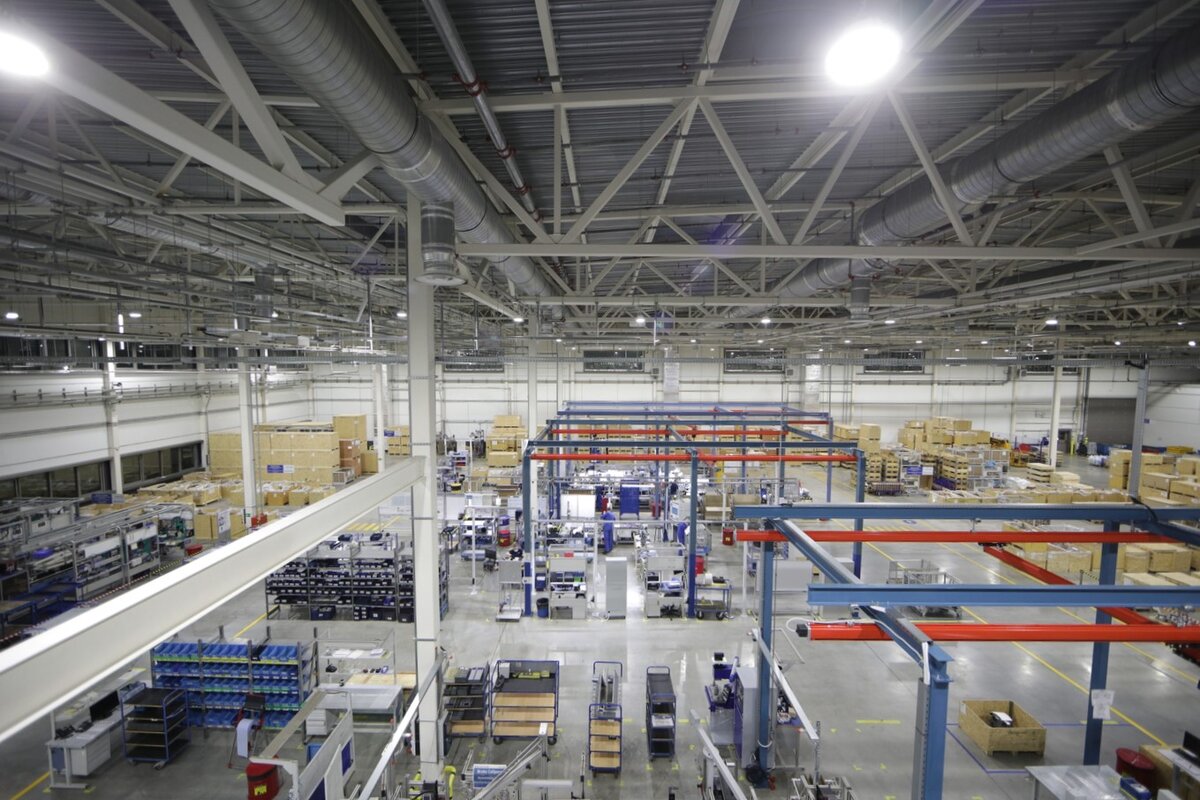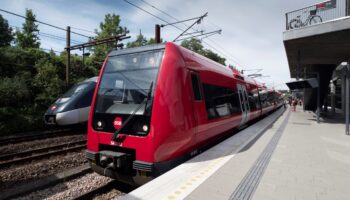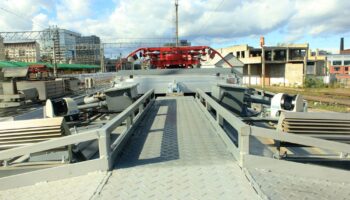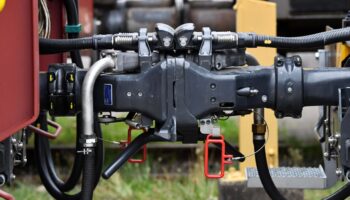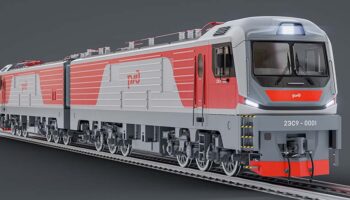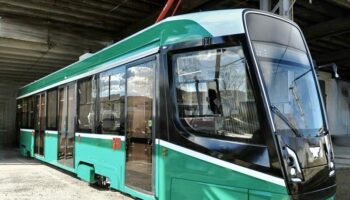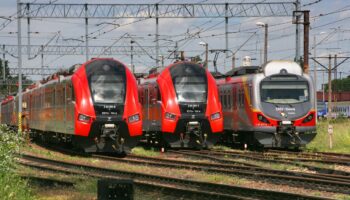Russia: The end of September saw the completion of the purchase of the Knorr-Bremse plant, KB 1520, in the Leningrad region. The buyer is Key Systems and Components Group (KSC Group), one of the largest manufacturers of rolling stock components in the country. The plant will become a basis for the Division Brake Equipment (DBE) in KSC Group, which is managed by the former team of the Russian Knorr-Bremse railway unit.
The division has two main targets. The first is to continue servicing the German-made components used on the Sapsan high-speed trains, Lastochka and Ivolga EMUs, passenger coaches, and metro. The second is to expand the product range as part of the implementation of the technological sovereignty strategy.
By global standards
The history of the Russian unit of Knorr-Bremse, the world’s leading supplier of braking systems for the transport industry, began in 2005 with the opening of an office in Moscow. Five years later, a separate business unit of the holding company began selling braking systems and providing after-sales and maintenance services in the Russian capital. In 2011, the company opened a plant in Voronezh to manufacture brake discs and pincer mechanisms. A further four years later, the production of brake control systems, brake discs, and pincer mechanisms began in St. Petersburg.
The new plant, KB 1520, was commissioned in 2020. It used the most sophisticated technologies, advanced equipment, and a modern management system, and had a first-class team. It is this plant that will become the key production asset of the DBE set up by the KSC Group a year ago.
“It took 9.5 months from the first discussion with Knorr-Bremse’s headquarters in Germany to the purchase of the plant”, says Ilya Germanenko, head of DBE. “Such a long period of time was due to the difficulty of working out an optimal and mutually acceptable deal structure in the midst of sanctions, numerous documents to be signed, a complicated procedure for transferring the purchase price to the so-called unfriendly country, and, most importantly, the need to obtain a decision from the Government Commission on Monitoring Foreign Investment and the consent of the Federal Anti-Monopoly Service of Russia”. According to Germanenko, a large team of KSC experts prepared the project in close cooperation with representatives of the German side and government agencies of both countries.
Available options
The 14,500 m2 plant is located in the north of St. Petersburg. The modern site houses production facilities, a warehouse, a fully integrated after-sales support centre, and an office. More than 120 people work here in three shifts, five days a week.
Key business areas are grouped into four segments: brake control systems, bogie equipment, air supply systems, and maintenance. The product range includes brake containers, control valves, other pneumatic components, brake discs, pincer mechanisms, shoe-type brakes, oil-free reciprocating compressors, air dryers, etc.
 Manufacture of brake equipment at KB 1520. Source: KSC Group
Manufacture of brake equipment at KB 1520. Source: KSC Group
“I’ve seen a lot of changes in the six years I have been with the company, and now we are taking another big step by joining the KSC Group”, says Igor Komarov, mechanical assembly foreman and chairman of the workers’ association at KB 1520. “During this time, we have managed to expand the product range and raise the quality level. Now we have new horizons for growth ahead of us, while problems related to sanctions and international relations, on the contrary, are receding into the background”.
Pavel Kravchenko, technician, recalls that in 2016 he was happy to join a serious and large company that offered excellent growth opportunities. “I am proud to be part of a great team of Knorr-Bremse professionals”, he says. “Now, after the merger with such a large Russian company as the KSC Group, new prospects are opening up for us to develop and increase our potential, which gives us confidence in the future”.
Defined perspective
Much has been done to prepare for the transaction, to avoid a shutdown, and to meet all contractual obligations. Now, says Ilya Germanenko, the key task for the near future is to integrate the plant and its employees into the group as smoothly and seamlessly as possible.
DBE’s tasks and goals are set for up to and including 2027. “It’s about mastering both the repairs and the manufacture of new equipment”, explains Germanenko. “The main challenge under the new conditions is to ensure the maximum level of localisation in Russia. We are already working on this, with some success, but of course we face many difficulties. However, the DBE team, which now includes our esteemed colleagues from KB 1520, is committed to positive results and is working hard on the projects. It is important to maintain what our colleagues have already achieved in the new conditions, their impressive progress in the most difficult localisation process, and to start new projects. These are mainly repairs of Knorr-Bremse braking equipment already delivered, thousands of items, and the launch of new products”.
It is planned to start with repairing shoe-type brakes for the Moscow metro, and to master the production of new such brakes, first for metro cars, and later for RA-3 Orlan DMUs. Then DBE management will master the repair of pincer mechanisms for passenger coaches and cars and compressor units, as well as the production of axle and wheel discs and pincer mechanisms.
From the first person
Ilya Germanenko, head of the Division Brake Equipment, KSC Group
It is difficult to overestimate the importance of acquiring such a facility for the development of the newly established DBE. KB 1520 is one of Knorr-Bremse’s newest production facilities in the world. It was designed and built according to the highest standards of the international holding company and incorporated many progressive ideas and solutions. Its most valuable asset is the people, the qualified staff, and the professionals who have gone through the school of the world’s leading player in the braking equipment market. We are very happy and appreciate that they are now with us, in the team of the KSC Group.
Denis Zaitsev, head of logistics, KB 1520
I started my career started at Knorr-Bremse in 2013 as a logistics specialist at our plant in Tver, which later moved to St Petersburg. I was then given the task of creating an efficient team to solve all the logistics issues of the plant. The task was solved, and we started to build a system for the inventory flow in three parts: import of equipment and components, logistics within Russia, and internal logistics and supplies for production needs.
We have imported key production equipment: assembly lines, test benches, and CNC machines. A lot of effort has been put into digitalising the production. For example, we implemented the SAP ERP system for logistics and planning for procurement and production.
During my time with the company, we have had to deal with the whole complex of relocation issues three times. Last year, we built the entire operations function from scratch. Geopolitics has made our lives much more complicated by disrupting established and customary supply chains. The sanctions forced us to reorganise our procurement functions, look at new suppliers, and do a lot to localise production. As a result, we have significantly expanded our list of transport service providers and our sales geography. We also moved to spot ordering to reduce logistics costs. These processes also affected the IT infrastructure: we localised the ERP system and switched from SAP to 1С:ERP.
Today marks a new chapter in the history of our plant. I am confident that by joining forces with the KSC Group team, we will be able to achieve significant success and strengthen our position in the market.
Stanislav Shvedun, head of rail service, KB 1520
I joined Knorr-Bremse eight years ago as a project manager responsible for launching production of brake control system units, such as distributor or load valves, for the Tikhvin Freight Car Building Plant. After a successful start, within two years more than 20,000 sets of equipment had been produced for its freight wagons.
As service director, I oversaw the overhaul and repair of the entire range of Knorr-Bremse equipment manufactured and operated in Russia and the CIS countries. We focused on increasing efficiency and productivity and reducing costs. We introduced a third production shift, optimised resource and material costs, and doubled the number of service products and the unit’s turnover.
Since 2021, the service unit has been fully operational at the new site in St. Petersburg, with a peak turnover of over RUB 1 bln ($14.6 mln, note by ROLLINGSTOCK). A year later, a disruption in the component supply chain threatened to halt repair activities, making the replacement of imported components a key challenge. Within four months, we localised the necessary components and resumed the overhaul of shoe-type brakes for the metro. We have now started to expand the repair of compressor equipment and brake control systems for key projects.
Given our history, we are optimistic about the integration of our plant into the largest engineering company in the Russian Federation, the KSC Group. I see this as an opportunity for the further development of the plant, a return to the maximum outputs we have demonstrated, and their increase.
Denis Vikharev, head of industrial engineering, KB 1520
In nine years at Knorr-Bremse, I have progressed from maintenance engineer to head of industrial engineering. I have been involved in all three KB 1520 moves, including the last one in August 2020. At that time, our production facilities were once again relocated to a modern plant designed and built under the careful supervision of the parent company and in compliance with all Knorr-Bremse quality standards. In my opinion, our company is one of the best production sites in the Leningrad region.
In August 2023, honoured guests visited our plant: Kirill Lipa, CEO of TMH, and Taras Spivak, CEO of the KSC Group. They were very impressed by our production practices and equipment. Over the years, the plant team has acquired all the necessary skills that will help us further develop production and lead the industry. However, we still have a lot to learn when it comes to developing new products. The goals the KSC Group has set for DBE are ambitious but achievable. We are expected to develop a shoe-type brake for the metro, pincer mechanisms and brake discs for the Ivolga, Lastochka, and Sapsan EMUs, and passenger coaches of the Federal Passenger Company. We will also master overhaul competencies for the entire range of Knorr-Bremse equipment.
I am confident the acquisition of the plant by KSC Group is the best thing that could have happened to us in the current geopolitical environment. Joining a large holding company, a real leader in the Russian market of railway components, opens up great and bright prospects for our team.
Maksim Kiselev, head of HR, KB 1520
I joined Knorr-Bremse in 2016 as head of HR. My main task was to form the backbone of our team and give people the opportunity to develop and grow professionally. In fact, I achieved this in 2016: the team was formed, and many of these people are still working with us, despite all the difficulties of relocations and market peripetias.
Today, we supply the Russian market with components for modern high-speed and intercity trains. All Sapsan EMUs, for example, are equipped with Knorr-Bremse brakes, door systems, heating, ventilation, air-conditioning, and power systems.
The holding company develops and implements advanced technical solutions for public transport, both underground and surface.
As part of the KSC Group, Knorr-Bremse’s local production will continue to manufacture products to high standards of quality and reliability, seek and develop local suppliers, and offer new advanced products for the rail industry.
KB 1520 is more than just state-of-the-art technology and high quality. It is also a local team that will continue to work within the KSC Group. A team with technical expertise, experience in launching new products, a process approach to production organisation, and a strong business culture based on respect and continuous development. We will integrate all of this into the KSC Group and strengthen its position in the market for key systems and components for rolling stock.
Based on the article “Landed in St. Petersburg”. Key Component magazine, No. 3 (12) 2023.





